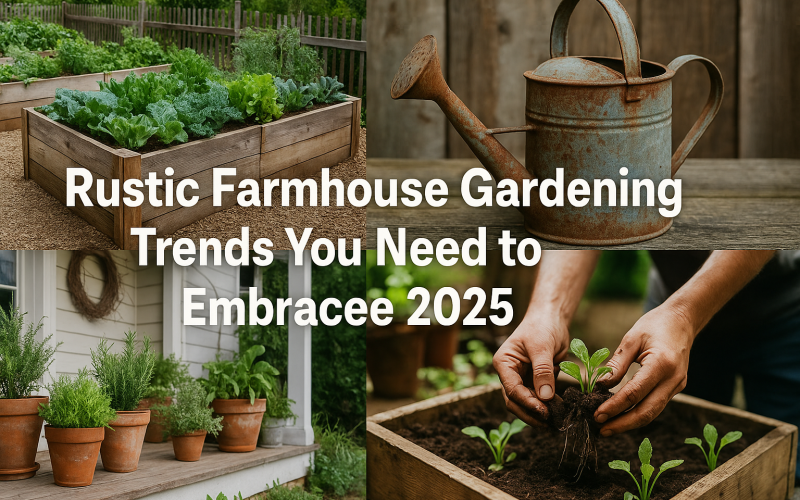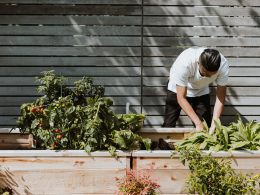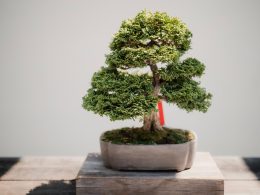Introduction
Rustic farmhouse gardening mixes country charm with simple, eco-friendly practices. In 2025, this style is more popular than ever. You see wooden planters, vintage tools, and beds full of herbs and flowers. The idea is to make a garden that looks cozy while also growing food and helping wildlife. This guide covers the top seven rustic farmhouse gardening trends you can try this year. You will learn easy ways to build raised beds, grow edible flowers, and invite bees and butterflies to your yard. Let’s explore how to make your garden both useful and beautiful.
Raised Wooden Planters
Raised wooden planters are built a few inches off the ground. They help improve soil, keep pests away, and reduce bending when you plant or harvest. Most people use old pallets, barn wood, or cedar boards. The wood weathers over time and fits the rustic style.
Why Use Raised Planters
Raised planters let you control soil quality. You can mix compost, peat, and topsoil for each bed. They warm faster in spring, so you can start planting early. Planters also keep out weeds and small animals. You can place them on lawns, decks, or even rooftops.
2025 Top Trends at a Glance
| Trend | Key Feature | Why It Works | Easy Starter Tip |
|---|---|---|---|
| Salvaged-Wood Raised Beds | Built from barn siding or pallet planks | Keeps waste from landfill, adds warmth | Line with landscape fabric to extend life |
| Pollinator Orchards | Dwarf fruit trees under-planted with wildflowers | Food + habitat in one zone | Begin with two self-fertile apples |
| Patina Metal Accents | Rusted troughs, tin roof shards, iron trellises | Textural contrast, no new mining needed | Use a stock tank as a herb planter |
| Prairie-Strip Borders | Native grasses mixed with blooms | Drought-tough, low maintenance | Sow seed mix along fence line |
| Smart Drip Jugs | Terra-cotta “ollas” linked to solar sensors | Old-world watering meets IoT | Bury one jug per three-foot radius |
| Upcycled Water Features | Whiskey-barrel fountains, hand pumps | Soft sound, minimal parts | Fit a solar pump to avoid wiring |
| Farm-Table Potting Stations | Counter built from door slabs | Saves stooping, doubles as buffet | Seal wood with food-safe oil |
Edible Landscaping
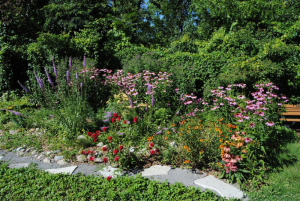
Edible landscaping mixes food plants with flowers. You might see lettuce next to lavender or tomatoes near marigolds. This trend makes your garden look colorful and also feeds your family.
How to Start Edible Landscaping
Choose plants that look good together. Herbs like basil, rosemary, and thyme work well as borders. Berries and small fruit trees make lovely hedges. Vines such as peas and beans climb trellises and add green walls. Plant flowers like nasturtiums and calendula to attract pollinators.
Pollinator Gardens
A pollinator garden is full of flowers that bees, butterflies, and hummingbirds love. These gardens help nature and increase fruit and vegetable yields in your garden.
Building a Pollinator Garden
Pick native flowers like coneflowers, black-eyed Susans, and asters. Plant in groups of five or more so pollinators find them easily. Add a shallow water dish with pebbles for bees to land on. Avoid pesticides, as they harm beneficial insects.
Heirloom Plants
Heirlooms are old plant varieties passed down through generations. They often taste better and come in bright colors. Heirloom tomatoes, beans, and squash are easy to grow and fun to try.
Benefits of Heirloom Plants
Heirlooms add diversity to your garden. You can save seeds each year to grow the same plants again. Their unique shapes and colors make your harvest special. They also carry history and stories of past gardeners.
Sustainable Composting
Good compost makes your soil rich and healthy. In 2025, simple composting methods fit any space. You can use a wooden bin made from pallets or a worm bin under a bench.
Easy Composting Tips
Mix green scraps (vegetable peelings, coffee grounds) with brown waste (dry leaves, cardboard). Keep the pile moist but not soggy. Turn it every few weeks to add air. In a few months, you get dark, crumbly compost to feed your plants.
DIY Vertical Gardens
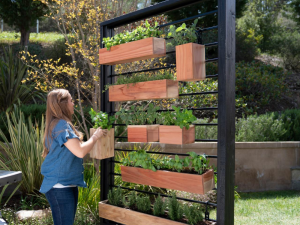
Vertical gardens save space and look charming. You attach pots or boxes to a wall or fence. You can grow herbs, strawberries, and small lettuce varieties in rows.
Setting Up a Vertical Garden
Use a sturdy board or old ladder against a wall. Hang containers with hooks or brackets. Fill with soil and plant small edibles or flowers. Water carefully so water drains down to lower pots.
Rustic Garden Décor
Garden décor brings the farmhouse look to life. Choose items that feel old and natural.
Décor Ideas
Hang metal watering cans on hooks. String up mason jar lanterns. Use woven baskets for tools. Lean a vintage ladder against a shed as a plant stand. These touches add charm without costing much.
Table: Seven Rustic Garden Trends
| Trend | Main Item or Plant | Benefit |
|---|---|---|
| Raised Wooden Planters | Barn wood planters | Better soil control, easy to reach |
| Edible Landscaping | Herbs and veggies | Beauty plus fresh food |
| Pollinator Gardens | Native wildflowers | Helps bees and boosts harvest |
| Heirloom Plants | Open-pollinated seeds | Unique flavor, seed saving |
| Sustainable Composting | Pallet bin or worms | Rich soil, less waste |
| DIY Vertical Gardens | Fence-mounted pots | Saves space, decorative |
| Rustic Décor | Vintage tools and jars | Adds charm, practical use |
This table shows each trend, its main item or plant, and why you need it.
Tips for Success
To embrace these trends, follow these tips:
Plan First
Sketch your garden layout before you start. Note sunlight and shade.
Start Small
Pick two or three trends at first. You can expand next season.
Use Local Materials
Check for free pallets or old boards. Local plants adapt best to your climate.
Keep It Simple
Rustic style thrives on natural, easy layouts. Avoid perfect symmetry.
Share and Swap
Exchange seeds and seedlings with neighbors to grow heirlooms and build community.
Conclusion
Rustic farmhouse gardening in 2025 is all about simplicity and function. Raised wooden planters, edible landscaping, pollinator gardens, heirloom plants, composting, vertical gardens, and rustic décor work together to create a garden that feeds you, supports nature, and looks beautiful. Start small, use local materials, and enjoy the process of building your own cozy farm-style garden. These trends help you grow food, attract wildlife, and craft a space that feels warm and welcoming.
Call-to-Action: Ready to build your rustic farmhouse garden? Pick one trend today, gather your materials, and share your progress with #FarmhouseGarden2025!






